Anna Blake's Blog
May 2, 2025
Can We Talk About Our Gray Mare Future?
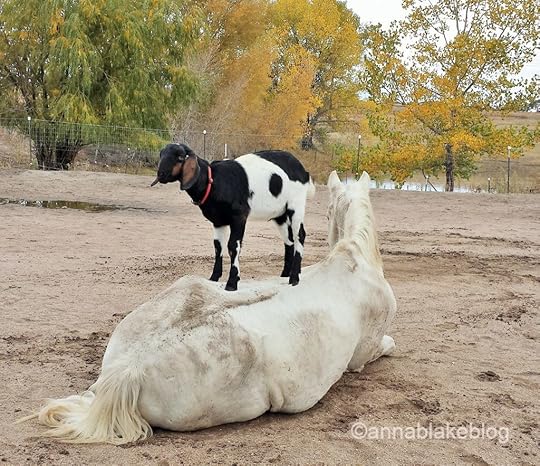
I’ve been pondering two conversations about horses lately. They aren’t very cheerful and I always know, no matter what I write about, I’ll end up poking someone in the eye when I don’t mean to. But people are touchy about horses, I notice.
The first conversation was several years ago, but I think of it so often. She and I were talking about horses and the future. I was traveling so much then, often gone from my home barn for more than half the year. I wanted a riding horse but my barn was full of retired horses and those aren’t the cheap ones. All of these adult reasonable thoughts fought against my love of riding.
My friend had just lost her beloved gelding. And now what? People had offered to loan her a horse. She was a serious rider, and I knew her loss was two-fold. Not just her brilliant boy, but also being able to ride in the way we both liked. For some of us, riding is like a separate entity.
We talked most of the day, acknowledging that our best riding years were likely behind us. Bittersweet honesty. In the end, my friend and I agreed on one thing. We didn’t want to know when our last ride would happen, especially if it already had. My friend died four months after her horse and I am still thinking about it years later.
Yes, there is life without riding. Not everybody spent decades studying it like we did. Some people think riding is cruel, and some never wanted to ride. Lots of us have barns filled with rescues and elders like I do, and we will feed and care for them no matter what, and enjoy it. I’ve written about all that, along with retirement plans and the importance of wills with funds left for their care. Not the topic today.
I even know that all of us plan to ride until we’re a hundred. Of course, that’s our plan. Until the day it can’t be the plan. Then we have to find another plan.
The second conversation was recent and at first, I didn’t understand what she was saying. She has spent a lifetime with horses, and is very knowledgeable. And she also rides bikes. She said she used to ride all over, arms folded on her chest and no hands. Yeah, me, too, I thought. Then she said she can’t do it anymore. Her balance isn’t there. I haven’t been on a bike in 25 years, and that number alone scared me. But in that instant, I knew I couldn’t do it either. She said horses must feel that, right?
It seemed obvious. I spent decades learning to ride using energy instead of force. Balance is a crucial concern in riding, but how does age change that? Did I even want to think about it?
I am not saying stop riding. I hope you ride forever. But be aware of changes. Be more concerned about your position in the saddle and aware your horse is balancing you as well as themselves. Then listen to what your horse says above what you want. Go for finesse instead of thrills. And if your horse is over 18, give them a break as well. Could we all act our age, not what we wished our age was? Even if it hurts?
What if this age thing isn’t wrong? What about the other kind of balance? These changes in our bodies are real and it seems to be all we can talk about. But didn’t you swear you wouldn’t be that old person complaining about their health? I could make a list of all of my failings of age, but then you’d respond list of your ailments, as if it was a competition. Some would be the same and we would commiserate. Saute in our mutual disappointment while we watch our toenails get thicker. Other challenges would be different, so we could be secretly relieved or pretend to be too humble to be envious.
It would be the easiest thing to just keep wallowing in the list of the things we can’t do, which feels a bit like circling the drain, maybe for another twenty years. Humans are such fatalists. We worry when society says our best years are behind us. But are we listening to the same people who spent the first half of our lives warning us we would amount to nothing? So easy to fall into that trap while rubbing icy-hot into that sore knee.
When I was 60, my two young Iberian sport horses were forced to retire, I had money problems, and my personal life was, well, stall rest would be the flattering term. My plans turned to confetti and sour milk. Not bragging, but I thought my problems were worse than yours. Self-obsessed is the word you’re looking for.
My age was catching up to me, and horse training is a young person’s game, but during a break in feeling sorry for myself, I remembered I used to think I had a book in me. It wasn’t ambition. I wrote to distract myself from my aforementioned tragic sorrow. Then I ended up traveling the world, meeting wonderful horses and people. I wouldn’t have dared dream it, and it isn’t that I was somehow magical. I floundered on. My life didn’t turn out as I hoped. It’s been even better.
Would it be the worst thing to think what we might do if, God forbid, our horse plans fell through, as they all eventually do? Instead of listing the losses, can we look for opportunities? I gagged a little writing those words, but really, what is the plan?
Let’s look at my non-horse-related strengths:
I still have my teeth. Midwest farm girl teeth that were like Swiss cheese in 4th grade. No floride in well water. But I refinanced my mouth. I’m proud of these crowns. Big smile. I got tired of jeans cutting into my waist and now I wear leggings without a tiny hint of embarrassment, although I know exactly how I look in them. I “pair them” with hooded sweatshirts, just like the ones I wore in high school. Not trendy hoodies, those cheap cotton sweatshirts. Love that pouch.I hold the armrest on the door and make sure my feet are solid, but I can still do that death-defying diagonal broad jump into the cab of my truck.Make a list of your strengths and share them with us, because we haven’t lost our sense of humor. Because fear gets squinty-eyed when we make fun of it.
Whether you ride into the sunset or follow a new dream that you’ve hidden for safekeeping, don’t sell yourself short. Rise to the new occasion. Sure, it takes more courage with each year because of the constant reminder that we are not who we used to be.
Truth is, we’re weirder, wrinklier, and prone to chronic lameness. But we also have life experience; survivors with dreams and common sense. We know more, care less about public opinion, and have spent our lives raising the next generation of kids and dogs, still working longer hours for less money. And all the while doing home repairs with duct tape, nail polish remover, and a good Phillips-head. Why would we underestimate ourselves now?
…
 An audio version of this essay is available to subscribers on Substack.
An audio version of this essay is available to subscribers on Substack.
Find Anna Blake and The Gray Mare Podcast on Substack or BlueSky social media. For specific training advice, search 1500 essays in our archives here.
If you or your horse appreciate my writing, please subscribe to this blog. Join us at The Barn School, our social and educational site, with member sharing and our infamous Happy Hour. Everyone’s welcome.
Visit annablake.com for archived blogs, signed books, subscribe to this blog, or ask Anna a question about the art and science of working with horses. Want more? Become a sustaining member, a “Barnie.” Subscribe to our online group and support the best bunch of like-minded horsepeople anywhere.
Ride for a new brand, find our Relaxed & Forward and Undomesticated Women swag at Zazzle.
Affirmative training is the fine art of saying yes.The post Can We Talk About Our Gray Mare Future? appeared first on Anna Blake.
April 25, 2025
The Glare On My Glasses
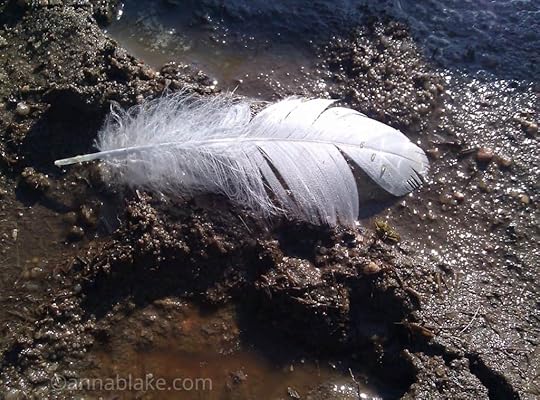
I have a confession. I am a gray mare who loves technology, pressing my nose to monitors and screens for hours each day. And yet, my brain is sharp, my knowledge grows. I can carry on philosophical conversations with donkeys, using an extensive vocabulary of words. Grammerly says the top 96th percentile. And I’m multilingual, fluent in calming signals of several species. I don’t miss a sunset and dogs still like me.
Somehow, our generation thinks it’s cool to hate technology. Or maybe it’s human nature to be critical. It’s our survival instinct. We’re wired to see things that aren’t right, just like horses. The difference is they bolt when they feel danger and we can reason it out. Recognize threats, weigh the risk, and choose our reaction. But we start the same, looking for the worst. We are born pessimists. It takes courage to trust, to be optimistic.
When I hear people talk about kids these days wasting time, always having their noses pressed to their smart phones, I have to smile. Is this our generation’s version of yelling at kids to get off our grass? People my age are prone to complaining about youth, but why do we see technology as the problem? Kids who are not computer literate will be left in the dust. Just like we will be if we don’t stop complaining and make peace.
Should kids be outside? Yes, and I hope they have a phone with them. They can call for help if they need it. They can time their runs, listen to books or music that inspire them. Keep up with the news and get home before the weather.
We are horsewomen, and traditional in some ways, but I hope we have phones with us when we ride. I know people whom that nasty little thing saved. I use mine to record notes when I muck because my best thoughts come then. Because I lose time in the barn, my phone means people can get hold of me. Best, I can see who’s calling and answer if necessary, or pick up the message later when I’m done scratching ears. When there’s a vet issue, I take a photo and text it off. Maybe save myself an emergency night call or load up and get help quickly.
If you have a cell phone, you can video your ride and see what your hands are doing. Perfect for self-awareness. Share video of the horse you’re looking at buying and ask someone’s opinion. You can take a riding lesson from me no matter where you live. And there’s a recording of the lesson when it’s over.
The obvious complaint is that sitting in front of a screen is unhealthy. Sedentary. Dormant. Dull. Idle. And it’s true. Science says sitting at a desk is more dangerous than horses. Maybe after working outside all morning, it could also be considered rest. If I’m teaching an online class, we are laughing, sharing the good and bad, and working to understand our horses. We can spend time together, regardless of what dead end road our farms are on.
As a writer, I sit in front of two monitors. I combine thoughts, creativity, and technology because it’s also the quickest way to do the job. These screens get me up and out sooner, a tool like my muck fork. The sooner I get done, the sooner my dog and I can play keep away. And I can take it all on the road and work from there. Call it working at liberty.
Of course, I make it sound rosy. I know there’s downside of all these monitors. But technology isn’t black and white. Its benefits clearly outweigh the drawbacks. Is it the machine or is it social media that we hate? I’m old enough to remember the innocent days when lost friends got in touch and kittens ruled the internet.
Now I wonder, when did we all get so mean? Does the screen give us permission to sit in a place of judgment on the sofa and be critical of everyone else? Do we give up our own search for understanding because it’s easier to hit “like.” Is there some blanket get-out-of-jail-free card for being cruel and now saying the meanest comment wins? Thumbs up or down, like the Romans. Life or internet death.
We all feel the pressure to be on all the time, as if Big Brother is watching. But one out of context photo and heroes can look like monsters. Lynch mobs ruin careers in a beat, without proof. Professionals quit, some commit suicide. Amateurs lose confidence for fear of criticism and the next generation is less willing to be vulnerable.
Haters have always been part of life. It seems that portion of the population has grown with social media or maybe just increased their volume and my dread. If we become cruel to each other, while feigning concern for animals, or any other worthy cause, don’t we become like them? We negate the good we hope for when we attack each other instead of the issue. I want to think we’ve gotten lazy. That it’s as if we fell asleep during a movie. When we wake up, we’ll do better and not take the easy choice.
We can’t put the genie back but do we really want to undo the progress that technology has brought? Or is the problem social media? Whining only adds to the trash. But we can pick and choose, knowing that our time is our vote. Some sites are still inspirational while others are slow-motion death and destruction. Is it time to give up Facebook and move to a better neighborhood? Join a kinder community like The Barn School or at least find social media places with less advertizing and more heart and intellect like Substack.
It can feel like life is out of control, but slow it down. There is always a choice. Consider affirmative training ourselves. Build each other up instead of tearing it all down. We will certainly make mistakes, but rather than magnify the misstep, shine a light on those trying to be the people that animals can trust. Each choice changes the world.

…
An audio version of this essay is available to subscribers on Substack.
Find Anna Blake and The Gray Mare Podcast on Substack or BlueSky social media. For specific training advice, search 1500 essays in our archives here.
If you or your horse appreciate my writing, please subscribe to this blog. Join us at The Barn School, our social and educational site, with member sharing and our infamous Happy Hour. Everyone’s welcome.
Visit annablake.com for archived blogs, signed books, subscribe to this blog, or ask Anna a question about the art and science of working with horses. Want more? Become a sustaining member, a “Barnie.” Subscribe to our online group and support the best bunch of like-minded horsepeople anywhere.
Ride for a new brand, find our Relaxed & Forward and Undomesticated Women swag at Zazzle.
The post The Glare On My Glasses appeared first on Anna Blake.
April 18, 2025
Septic Tank Trauma
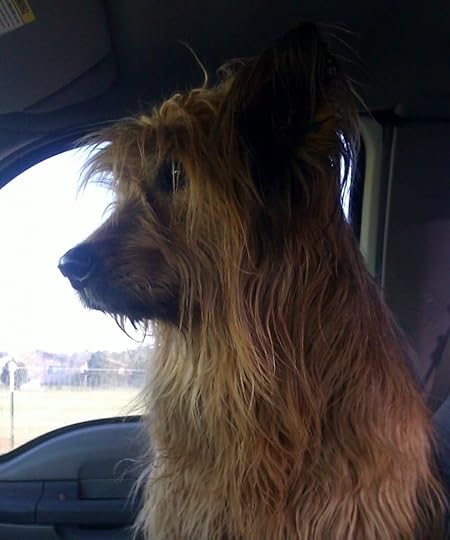
I bet you flush the toilet in town without a hint of paranoia. I did before I bought my farm. Those sacred words. My farm.
My realtor was the only one in the office willing to work in my price range. The horse shed was in better shape than the house, but that was fine. There was flat sandy soil, the size of a dressage arena, out by the road. I was being practical, even responsible, because if I came off my horse, eventually someone would drive by.
The week before closing, I raced from Denver to meet the inspector, but got caught in traffic. When I arrived, the inspector was gone, but my realtor handed me the paperwork. She said we passed. My farm had a pond; waterfront property on the desert prairie. There was a highlighted note in the report stating the leach field was half under the freestanding garage. I asked if that was a problem. In those innocent days, I wasn’t sure what a leach field was. The realtor shrugged, repeating that it passed inspection. By the look of her shoes, she probably didn’t know what a leach field was either.
I didn’t think about it again. Too busy tearing out orange shag carpet and building fence. The house has a shower, with a window overlooking the barn pens. I still get some of my best ideas standing there, brushing my teeth, and gazing at my favorite horses. One morning I stepped into the shower, and not even 10 feet from the house, there was a 6×8 foot rectangular hole in the ground. It was black, so probably deep. The theme from Twilight Zone rose out of nowhere. I barrelled out the back door, with my dog, Howdy, leading the way. The ground was slick. I followed him around the corner of the house, just in time to see him back-pedal to a teetering stop, one of his front paws waving in midair. Easy to identify as the septic tank now. I skidded, grabbed Howdy’s collar, and pulled him back. And that’s the happy ending. Howdy was unscathed. The story is not nearly over, but if you want a happy ending, stop here.
For the next two years, there was a bright blue tarp over it, rocks holding the edges down. Between my move and the 9-11 attacks, my business was floundering. Not my best days. I was cleaning other people’s toilets to make ends meet. Eventually, I found out septic tanks need to be pumped, who knew, and made an appointment. They asked if the septic would be easy to locate. Yes, I said.
A bit of backstory. I am not always a trusting person. It started when I bought my first car in high school. It was VW Bug with bald tires. So mature, I went to a tire store. I was the last customer of the day, almost 9pm and I was reading in the waiting area. Two or three men done for the day gathered at the cash register. Then peels of laughter. They were boasting about ripping off a woman. So hilarious how foolish women were about cars. Was it me? Did they not know I was there?
I stood up and walked over, forcing a steady voice and making eye contact. I spoke up, but it was probably the sight of a customer embarrassed them into silence. My car got finished quickly then. Driving away, I knew I was their next hysterically funny joke. The look on my face must have been laughable. Since then, I’ve hired drunken carpenters, nearly came to blows with a roofer, and had a large equipment operator proposition me. But I digress…
The man who came to pump my septic looked at the tarp in horror and immediately claimed to be my best friend. He told me the entire system needed to be replaced, costing thousands of dollars. Imagine my face. Then he suggested a shady character, I mean, a man he knew, who could put a metal lid on it with no permit, cash only. It was an obvious choice.
Twenty years flew by and recently a different man in a different pump truck told me the septic was breaking down. It was too small, the cement was crumbling, it needed to be replaced. I’m skeptical. The entire system, I ask. Nope, just the tank, he says. Still, I research online because that’s not what the last guy said. And I am permanently skeptical now.
After a couple of estimates, I pick the older man who was polite, humble, but had a higher estimate. He was a shill. His fortyish son does the work. The son carries himself like a bull rider, puffed up and cocky. When the new tank had been planted, he says we need a leach field. It isn’t dependable, he says, this miracle under the garage. He shakes his head. You can hook it up to the old one if you want to, and hope it doesn’t back up, he says. The words sound almost like a threat. Why is he pushing? An allergy to skeptical old women who ask hard questions?
I stand there, an older version of the girl in the tire store, looking for answers. He speaks down to me, repeating the same problem again. I tell him I understand. That wasn’t what I was asking. I might be an idiot, but the leach field was still working. When I ask for a price range, he throws his hands theatrically into the air. It starts at a few thousand, he says, but the sky’s the limit. It could cost anything. Really, you can’t even guess?
Then he asked if I had children. I looked at him for a long moment because it was all I could do to not kick him. Instead, I said, it was none of his business. Because it wasn’t. Undaunted, he asked who would get the farm when I died. Did I want to leave it in poor condition?
I wondered if he expected me to take out a 20-year mortgage for my non-existent children? And who threatens old people?
Well then, he said, it will still need a leach field to sell. Like last time, I thought?
He was hawking septic systems like used cars. Maybe his small business is struggling like mine. Who knows? I still didn’t trust him. A month has passed and the new septic tank is playing nice with the old leach field. For now.
This is what I know. A septic tank is every bit as fun as shopping for a vacuum cleaner. Or getting a root canal. Or buying tires when you’re 16 years old. And much of life revolves around one kind of excrement or another.
No, this isn’t the usual essay about training horses. But maybe this is how horses get sour. Not a big incident, but the nagging memory that you aren’t safe. Not everyone prioritizes your well-being. An ongoing pattern of knowing you’re vulnerable. Feeling like prey. Is it really so different? Doesn’t everything come down to a question of trust?
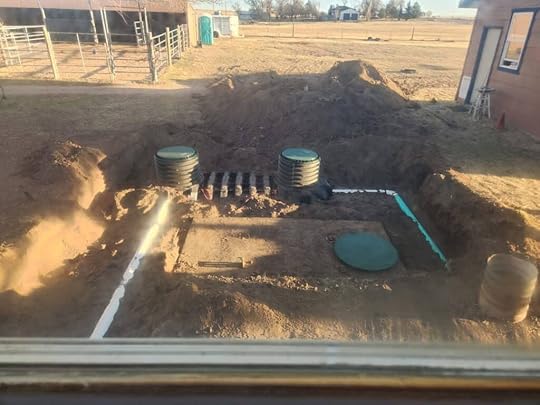 The view from the shower.
The view from the shower.…
 An audio version of this essay is available to subscribers on Substack.
An audio version of this essay is available to subscribers on Substack.
Find Anna Blake and The Gray Mare Podcast on Substack or BlueSky social media. For specific training advice, search 1500 essays in our archives here.
If you or your horse appreciate my writing, please subscribe to this blog. Join us at The Barn School, our social and educational site, with member sharing and our infamous Happy Hour. Everyone’s welcome.
Visit annablake.com for archived blogs, signed books, subscribe to this blog, or ask Anna a question about the art and science of working with horses. Want more? Become a sustaining member, a “Barnie.” Subscribe to our online group and support the best bunch of like-minded horsepeople anywhere.
Ride for a new brand, find our Relaxed & Forward and Undomesticated Women swag at Zazzle.
Affirmative training is the fine art of saying yes.The post Septic Tank Trauma appeared first on Anna Blake.
April 11, 2025
The Nebulous Path to Partnership
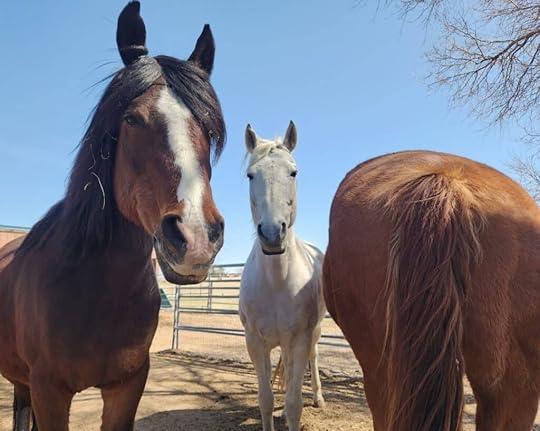
Drawn like magnets, humans want to be near animals so badly. We can’t help ourselves, but we are a little scary. Animals should look at us cautiously. Consider their wry skepticism an honest survival instinct. We have only good intentions, but our love is red hot and we start young. Haven’t we all seen toddlers carrying pets who look nervous? Maybe the child is gamboling across the yard, half strangling a cat with one arm, giggling and running to show everyone. She catches a toe like all toddlers do, and they both take a tumble. Now there are tears and cries, scratches and blood. The cat has bolted, and the child doesn’t quite know what happened.
This is a great example because the youngster is cute to some of us, while others are horrified for the cat. A great example because so many of us act like children around animals. With the best intentions, we clutch them to our bosom or tease them or dominate them. Their behavior becomes a referendum on our pride. If the animal lets us walk up, if we can touch them, we beam and brag as if it’s hard proof of our superhuman worthiness. Look, the grizzly bear likes me.
This connection we want most is the nebulous part. I ask my clients about their goal or what they want to do. Do they want a tidy canter depart, or maybe it’s time to drive the mini? You know, something visible and quantifiable, like clearing a jump. But no, everyone wants a better relationship with their horse. Nebulous because it’s apples and oranges. Relationship is a human construct, a concept only existing in our minds. Horses are more concerned with safety in the real world, as any beautiful, intelligent flight animal should be.
Is sharing breath with a horse relationship? Or is it about trusting each other with our lives? Is it lace-dress-at-sunset romantic or is it being reliable when trouble arises? Do we pamper our horse like a lapdog or do we try for another nebulous goal like building their confidence? It would be simple if a partnership was something that you could buy off the shelf. Sure, there are training programs that promise a trusting relationship in a quick three-step process. Send the check today.
Packaged answers don’t work because each pair, horse and human, are so unique. Some horses have personalities and behaviors that frustrate us until someone mentions the horse is just like us. Then we have to reconsider if we might be in our own way. Other horses are just so quirky and different that we feel lost. They say opposites attract, and that might have been the plan when you got the horse. It’s a little overwhelming a few months later when your horse is still ignoring you. But none of that matters. Breed, purchase price, riding discipline… A skinny auction horse or high dollar competition horse, it’s all the same.
How to begin a conversation with an alien creature who doesn’t speak English and won’t leave the herd? How do we form reality out of the nebulous? Think both of you are undomesticated. Because we behave better with wild animals. We use our senses more and take less for granted.
The thing we call relationship is easy for horses. They live a cooperative lifestyle in a herd. There is no dominance battle for alpha nonsense, another human construct. And remarkably, after centuries of humans being less than humane with horses, they still volunteer to engage with us. Clearly, any issues are ours.
Relationship is harder for humans because we like to be right. It means we must care more about who they are and how they feel, more than what tasks they can do. We have to do it when they are insecure or confused. When they need to feel safe, even if it’s inconvenient for us. But this is the best part. We start that conversation toward safety with a task. “Can I help you relax in your canter depart? Can we ground drive over a tarp?” Nebulous but partly familiar.
It isn’t what we ask that’s different, it’s what happens next. We enable them to have a voice. You’d think this was easy, but it means that we shut up and linger in the nebulous. It isn’t fair to cross arms and judge everything that happens. Instead, we say yes. Whatever they answer, even if it seems they don’t answer, they are right. It sounds like a cliche, but this is what they mean when they say lay down the ego. We don’t think we have an ego until the horse refuses what we think is a simple task and the desire to throw a tantrum crosses our mind.
That is the perfect moment to blossom. When we learn it’s okay that we don’t always get to have our way. The forced predator brow releases, and every horse within a mile blows. Negotiation makes us softer.
We accept there will be things that are imperfect in the animal and in us. The secret is to focus on the best. We must practice radical acceptance because only then will our bodies convey that the animal is safe. We give up fighting, not that we become doormats. It’s more that we demonstrate the behavior we hope to see. We mentor good habits rather than force compliance.
Recently, someone asked me to recommend a horse training book that helped me. The books I read before aren’t necessarily what I would recommend now. No criticism, but if you are asking me personally, I’ve been looking for inspiration in fresh, unexpected places. The best horse relationship book I’ve read lately is Raising Hare by Chloe Dalton. It’s about respecting the autonomy of animals.
Partnership, this connection we dream of, work toward, wish was visible every moment, is an inside job. Not so much about the animal at all. When we let go of our clutching need, freedom emerges. I’d love to say all goals are easily possible. Just like real life, some work out and some don’t. We accept horses are a nebulous collection of individuality, experiences, and emotions. Perhaps not the answer we hoped for, but even that is a statement of trust between you. An honest “I can’t do it” is as good as a gold medal because you have risen above a primal language of predator and prey.
Comes a day when you can’t separate yourself from your horse, you see through his eyes. It’s deeper than understanding. Maybe they didn’t meet your expectations or maybe they changed you instead. Reaching the goal might not look like you expected. Partnership means it was never up to you.

…
 An audio version of this essay is available to subscribers on Substack.
An audio version of this essay is available to subscribers on Substack.
Find Anna Blake and The Gray Mare Podcast on Substack or BlueSky social media. For specific training advice, search 1500 essays in our archives here.
If you or your horse appreciate my writing, please subscribe to this blog. Join us at The Barn School, our social and educational site, with member sharing and our infamous Happy Hour. Everyone’s welcome.
Visit annablake.com for archived blogs, signed books, subscribe to this blog, or ask Anna a question about the art and science of working with horses. Want more? Become a sustaining member, a “Barnie.” Subscribe to our online group and support the best bunch of like-minded horsepeople anywhere.
Ride for a new brand, find our Relaxed & Forward and Undomesticated Women swag at Zazzle.
Affirmative training is the fine art of saying yes.The post The Nebulous Path to Partnership appeared first on Anna Blake.
April 4, 2025
Cowboys and Liberals

When people talk about the romance of farming, I think they’ve watched too much TV and read too little Steinbeck.
I grew up in a dictatorship. It was a farm in Minnesota ruled by my father. People don’t get rich farming. Decisions were made for our survival, not the animals. We ate what we raised. Nearly self-sufficient, there was no room for waste. We didn’t keep older animals. We killed mixed-breed lambs and drowned litters of kittens. I don’t remember ever calling the vet. Once my father killed a dog in front of me, saying I ruined him for sheep herding by playing with him. I was 45 when I found out that dog had brought down a sheep. In other words, my father killed two birds with one stone.
But don’t feel sorry for me. I was that little girl who talked back and thought she was as good as anybody else. I didn’t behave like they expected or wanted. In those days, it was called being a tomboy. My father and I were in a constant fights about animals, and when I got older, politics. Farmers are conservatives mostly. It used to be the party of the self-made man, the rugged individual. Think old west.
Oddly, I took a left turn in catechism class. What can I say? Like my friends, I dreamed of being a nun. It was a short-lived fantasy, they didn’t have horses. But how could I resist the parable of the sheep and goats? Eventually I left that church and I spent my Sunday mornings singing hymns to my horse. My ideals of love and compassion stayed on as my excuse for rescuing animals. I grew up watching John Wayne and fell in love with the handsome man in Guess Who’s Coming to Dinner. I got complicated. To my family’s horror, I became a liberal. A damned peacenik. Some teenage girls think their parents don’t know them at all. Mine did.
When we’re kids, adults are always telling us we’ll grow out of everything we dream about. That at a certain age, we’ll get a proper job, have babies, regret our foolishness and get normal. That we will put away childish things, as they say. Even as a kid, I understood that violence (what we now call fear-based training) didn’t work on animals or little girls. I never outgrew my spiritual beliefs or my politics. I continue to talk back. And I still routinely grow out of my jeans.
They call farms like mine a “hobby farm” and I’m not kidding myself. “… many farmers in the US rely on off-farm jobs to supplement their income, with roughly 85% of family farmers relying on other jobs to support their livelihoods.” (Ambrook Research, Sep 29, 2022) I know I’m a total dilettante because my farm is a democracy. We all get a vote here. Let the horses run, let the dogs bark. I call the vet whenever we need one. We celebrate useless animals and we never eat anybody. And we keep the warmest stall for rescue elders who get a one-way ticket to this rickety little farm where even the feral cats are fat and shiny.
We aren’t old style though. We stay up to date with current science to improve the lives of all the animals here. I’m an affirmative trainer; I wage peace like a pinko lefty. That’s a joke, but not really. It’s the sort of heckle that I get sometimes. Critics agree with my father that I’m too soft and train like a girl. I don’t wear the right hat. Cowboy tradition dictates that we should dominate and demand respect from horses. It’s more than that. Americans love the cowboy culture. Western movies and rodeos with boots and spurs and bucking broncs. It has even been a recurring theme in American politics, often used to project a conservative image. Sometimes it’s even been used to describe foreign policy approaches. Politicians and money people don’t want to be cowboys, just dress that way.
Hear me out. I have been careful to use the terms conservative and liberal because we disagree on philosophy. Training has been a debate in the horse world since the Greeks and Romans. It’s our tradition to be divided and divisive. We nip at each other’s heels, but we share a grand passion for horses.
While we were building fence, comparing saddles, and bickering on social media, the minority with money set too many of the rules. A certain sort of person who sees horses as an elite sign of wealth. They are able to dabble, might not ever ride, but still dominate our industry without restriction or oversight. The affluent who see horses as a beautiful creature to bet on, to be entertained by, to use up. Sound familiar?
It feels like we can’t fight the money establishment who control the industry, while the rest of us feel the pinch as hay prices go up. We’re busy doing our best for horses and protecting their legacy. Horses didn’t invent computers, but they carried us to this place in human evolution. Even if horses have outlived their historic usefulness, we remember how we got here. Is that conservative or liberal? Or have ordinary horse owners become irrelevant?
Well, what do politicians and millionaires know? They think animal lovers are sissies and out-of-date losers. That those of us that live on the land, know the Earth as a friend, and put food on their tables are useless as a lame horse. Maybe they think we will become doormats to be muddied on the way to an AI driven autocracy where the rich get richer and we can’t afford to plant a garden or keep a dog.
They are obviously wrong. Rugged individualism and self-reliance aren’t conservative catch phrases. They are the survival skills. We may have hat hair and muck boots. Wrinkly skin from days in the sun and dirt under our nails. They may dismiss us as horse-crazy girls who have gone gray-haired and irrelevant. But we are wolves in sheep’s clothing. Children of the immigrants who built this America. And we have mucked out worse than them before breakfast.
I wonder what my father would think if he were still alive. He was proud of not voting for Nixon but only because he voted for George Wallace. He thought I was worse than foolish to own horses. But he also saw a bit of himself in his wayward artist daughter. Our pioneer forebears taught us both to be independent. I came to respect John McCain for crossing the aisle and my father voted for the liberal in his last election. What would he think today, my father, who was a WW2 veteran? I think he might agree with Cory Booker.
“If America hasn’t broken your heart, then you don’t love her enough.”
 …
…
 An audio version of this essay is available to subscribers on Substack.
An audio version of this essay is available to subscribers on Substack.
Find Anna Blake and The Gray Mare Podcast on Substack or BlueSky social media. For specific training advice, search 1500 essays in our archives here.
If you or your horse appreciate my writing, please subscribe to this blog. Join us at The Barn School, our social and educational site, with member sharing and our infamous Happy Hour. Everyone’s welcome.
Visit annablake.com for archived blogs, signed books, subscribe to this blog, or ask Anna a question about the art and science of working with horses. Want more? Become a sustaining member, a “Barnie.” Subscribe to our online group and support the best bunch of like-minded horsepeople anywhere.
Ride for a new brand, find our Relaxed & Forward and Undomesticated Women swag at Zazzle.
Affirmative training is the fine art of saying yes.The post Cowboys and Liberals appeared first on Anna Blake.
March 28, 2025
Spring Fever and Trailer Loading
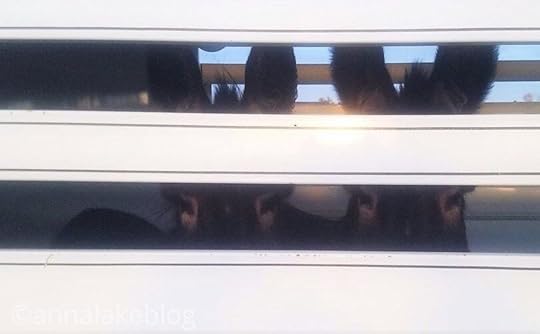
You’ve been home all winter, working outside until the tips of your fingers sting. Carrying fifty-pound bags of feed over ice, falling down but not feeling a thing. Partly the cold and partly with so many layers you feel nothing, but also can’t quite sit up. So, you lay there a while plotting the smart way out of this predicament and whether you need to install grab bars outside. The goat wanders by, gives you the side eye, and sees nothing worth scavenging. Fine. It’s come to that.
 As you consider a belly crawl to the nearest fence, you see the object of your passion, your raison d’être, the big what for. The perfect embodiment of all your childhood dreams and future fantasies. Your elegant horse, who looks like a thousand-pound stuffed toy that was abandoned by the side of the road in 1936. Muddy, matted, and not recognizable by color. Just then, you hear a small voice in your head that sounds like your mother from beyond the grave, saying it really is time to quit your foolish…
As you consider a belly crawl to the nearest fence, you see the object of your passion, your raison d’être, the big what for. The perfect embodiment of all your childhood dreams and future fantasies. Your elegant horse, who looks like a thousand-pound stuffed toy that was abandoned by the side of the road in 1936. Muddy, matted, and not recognizable by color. Just then, you hear a small voice in your head that sounds like your mother from beyond the grave, saying it really is time to quit your foolish…
And a miracle happens. It’s the same annual, but totally unbelievable, miracle. It’s a robin. The next day, a meadowlark serenades you, trilling to the sky. The green can’t be far behind. Hibernation is over, you pull off your Elmer Fudd hat and stand tall. Seconds later, the trails are calling or the show schedule dings its arrival on your phone. Riding with people you don’t even like sounds fun. You just want off the farm.
It must be spring. People are asking questions about trailer loading. Naturally, I’m nostalgic about the horses and donkeys I’ve hauled. It’s a special thing to share with them. At my first professional training job, I trained eleven weanlings to load. You really want to get it right with youngsters. And that’s just what I was doing. We’d walk up a hill to the trailer, quietly step inside, and then return to the herd, back down the hill. The icy hill. So the babies and I would take one step at a time, halt careful and quiet, and then take another step. I soon got fired from that job. Complaints from the head trainer. You can fill in the blanks.
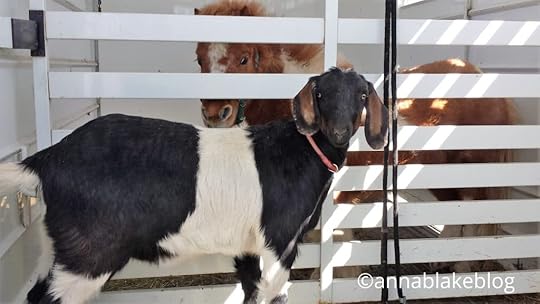 There were years of hauling my own horses, hauling relinquished horses for the rescue, and hauling clients to shows. I made a standing offer to haul any horse to the vet for clients and sometimes people they knew. I got one colicking mare to the vet in time, but the vets could not save her. Several hours later, she was euthanized and her owners blamed me. Loudly hurling insults, because they were mad and hurting. I apologized again and again. Hauling horses isn’t for the skittish.
There were years of hauling my own horses, hauling relinquished horses for the rescue, and hauling clients to shows. I made a standing offer to haul any horse to the vet for clients and sometimes people they knew. I got one colicking mare to the vet in time, but the vets could not save her. Several hours later, she was euthanized and her owners blamed me. Loudly hurling insults, because they were mad and hurting. I apologized again and again. Hauling horses isn’t for the skittish.
If you are new to hauling, make sure you have the right trailer. It doesn’t need to be fancy, but it must be tall and wide and light-colored inside. Then start several hours early, not that time matters. Give your horse a gut supplement every single trip. Hook up the trailer, and then double check each part. Prepare ahead with a checklist of what you need to take along with the horse. Load it all up and then double check the gear. The goal is that once the horse is in the trailer, you roll away. Then triple check the hook up again. Drive slowly, like your grandmother, if she was decrepit and loved horses. Take extra slow care on corners. If city cars honk, you’re going the right speed.
If you are not new to hauling, no worries. Whatever happened last fall, your horse hasn’t forgotten a thing. If it was all good, it still is. Go slow and it’ll be fine.
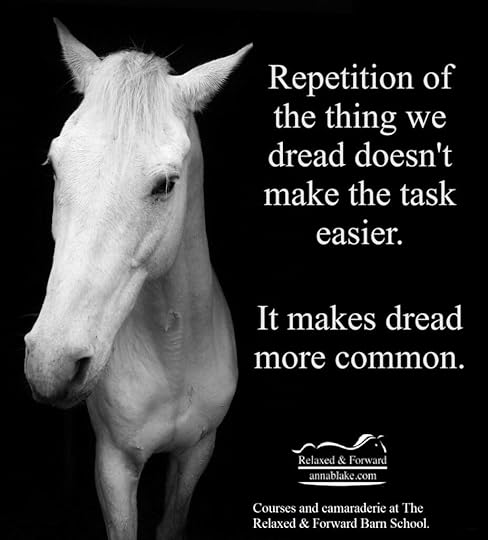 If things didn’t go well before. If you tried twenty different techniques and none worked, but now your horse is even worse than they were, you have a problem. They are right to think you’re inconsistent and not all that trustworthy. Impatience or frustration feels like a threat to a horse. Maybe you tricked them into the trailer, teased them with food or threatened them with intimidating ropes to force them in. You hoped they’d get used to fear. That they’d forgive you. Maybe you are foolish enough to hope they’d forget the fight.
If things didn’t go well before. If you tried twenty different techniques and none worked, but now your horse is even worse than they were, you have a problem. They are right to think you’re inconsistent and not all that trustworthy. Impatience or frustration feels like a threat to a horse. Maybe you tricked them into the trailer, teased them with food or threatened them with intimidating ropes to force them in. You hoped they’d get used to fear. That they’d forgive you. Maybe you are foolish enough to hope they’d forget the fight.
You tried all the online videos, but they are nonsense. Those techniques don’t work. And you’re right, they don’t. (Go to that link, I mean it.) Horses are not dirt bikes. They have emotion and memory, and above all else, they are flight animals. If you are not listening to their calming signals and responding to their concerns, why should they do what you want?
Start here: Did you get embarrassed when you needed a few tries to line up the hitch? Did your breathing go shallow when you dropped the coupler and cranked up the trailer jack? Are your shoulders up by your ears now? Are you running late? Do your feet slap the ground hard when you walk to get the halter? Did the gate latch to your horse’s pen stick and need a good loud whack to open?
Slow down. You’ve already told your horse there will be a fight and you haven’t haltered him yet.
What if your horse is fine in the trailer, but you are the nervous one? Maybe he doesn’t know why you’re anxious, but he better take a closer inspection of the trailer and try to see the scary thing you see. Is now a bad time to remind you that having a “connection” with a horse is more than sharing breath. And horses are not our therapists or children or saviors. They need us to be our best selves for them. And trailer loading issues are more common in people than in horses. So, maybe it’s another kind of spring cleaning needed before you’re ready to load up.
Meanwhile, don’t underestimate your horse’s intelligence. Any horse standing behind a trailer with the door open, knows the question. They don’t need to be retrained every trip. Most horses know what to do if we get out of the way. Your job is to not chatter or nag. Breathe, be tranquil, and trust the calming signal conversation will do the rest.
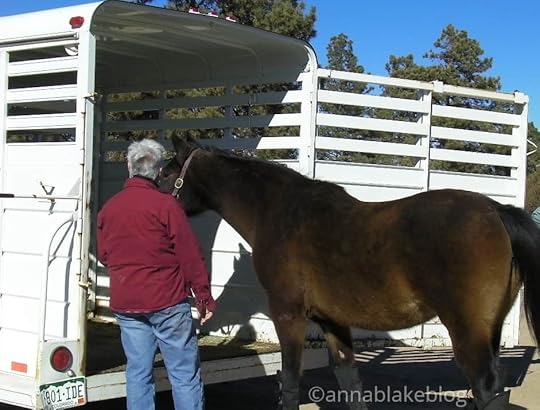
…
 An audio version of this essay is available to subscribers on Substack.
An audio version of this essay is available to subscribers on Substack.
Find Anna Blake and The Gray Mare Podcast on Substack or BlueSky social media. For specific training advice, search 1500 essays in our archives here.
If you or your horse appreciate my writing, please subscribe to this blog. Join us at The Barn School, our social and educational site, with member sharing and our infamous Happy Hour. Everyone’s welcome.
Visit annablake.com for archived blogs, signed books, subscribe to this blog, or ask Anna a question about the art and science of working with horses. Want more? Become a sustaining member, a “Barnie.” Subscribe to our online group and support the best bunch of like-minded horsepeople anywhere.
Ride for a new brand, find our Relaxed & Forward and Undomesticated Women swag at Zazzle.
Affirmative training is the fine art of saying yes. Available Now! My new travel memoir is Undomesticated Women, Anecdotal Evidence from the Road. Ride along on a clinic tour through 30 states, 2 oceans, and 14k miles with me and my dog, Mister. It is an unapologetic celebration of sunsets, horses, RV parks, roadkill, diverse landscapes, and undomesticated women. Available now at Amazon, Barnes and Noble, and signed copies from me.
Available Now! My new travel memoir is Undomesticated Women, Anecdotal Evidence from the Road. Ride along on a clinic tour through 30 states, 2 oceans, and 14k miles with me and my dog, Mister. It is an unapologetic celebration of sunsets, horses, RV parks, roadkill, diverse landscapes, and undomesticated women. Available now at Amazon, Barnes and Noble, and signed copies from me.
…
The post Spring Fever and Trailer Loading appeared first on Anna Blake.
March 21, 2025
Do Companion Animals Get Compassion Fatigue?

Lately, I’ve been worried about fluffy little lap dogs whose coat has gone oily and flat from excessive petting. Concerned about Golden Retrievers are being used as body pillows, both night and day. Anxious for horses who have pulled deep inside, barely breathing, as their owners press their foreheads on them, hoping for a healing. I’m not worried about cats, but more about them later.
Perhaps you’ve noticed I’m writing more about stress recently. Sadly, we are all its prey. I’m an affirmative trainer/amateur couples therapist, helping horses and humans find common ground. Stress is a survival mechanism, our internal warning system, that danger lurks. I define stress as the inevitable natural state of being alive.
Horses are honest about stress. Famous for spooking, being bigger than we are, and at least twice as aware. They can be dangerous, but don’t hold it against them. They are prey animals, like bunnies and squirrels. Their only defense is their stress response: flight, fight, or freeze. Flight is usually the first choice, reminding us they are never truly tame.
Dogs have a similar stress response, with similar body language, or Calming Signals, to communicate it. Like horses, they run away, put their ears back, yawn, lick lips. Dogs are different in that they carry a distant memory of hunting. They have been hanging out with humans at least ten thousand years longer than horses, so we know each other better. But dogs and horses have the advantage. They don’t worry about the future.
Human animals are more complicated. We have that similar flight, fight, freeze stress response. Survival means we look for the danger. Like other animals, we focus on the worst possibility. Born pessimists who must work to see the good side of life. We also have that pesky frontal cortex, so we can worry about our thoughts.
Of course, all animals have emotions. Science has proven it, but it’s also common sense. Who needs a stress response if they don’t have emotions? If you look at it that way, emotions are at the center of every conversation. It’s the very heart of the work I do with horses who often have emotional challenges and even psychological damage from the past. Like us, the kind of stress that can’t be cured with a carrot.
Sometimes it wears me down to see all the misunderstanding, misuse, and pain toward horses. Call it stress because depression is too depressing. Sometimes I’m inspired and lifted by the brilliant progress my clients are making, so thrilled that their horses can breathe again. Still emotions, but call this a prettier color of stress. It can be a ping-pong ricochet of feelings at the speed of a hand gallop. It has a name: compassion fatigue, but I take little comfort that it’s considered a psychological condition. You catch it from prolonged exposure to the suffering and trauma of others.
But it is also human to want to help. It was twenty years ago that my dog, Hero, and I began visiting nursing homes. Each time, it was like I didn’t know him. We were in the hospice rooms with very frail people. He behaved in unimaginable ways, different with each patient. Home again, he’d sleep for a full day without eating. I had such mixed feelings, seeing the joy he brought and also the cost he paid.
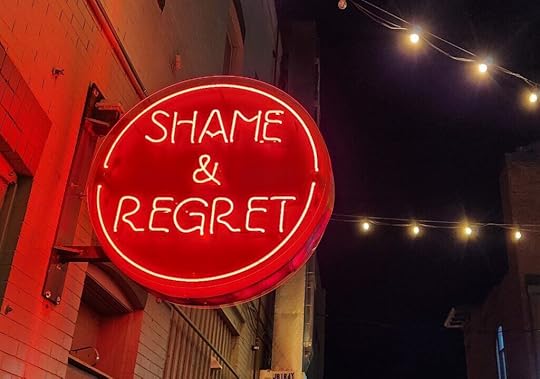 Do we ask too much? Do we take advantage of an animal’s ability to feel emotion? Not just in therapeutic service, but can animals get compassion fatigue just living with us? Surely you’ve seen the dog cower during an argument. The way they stay close when we’re sad. Are they mourning loss or do they wilt under our grief?
Do we ask too much? Do we take advantage of an animal’s ability to feel emotion? Not just in therapeutic service, but can animals get compassion fatigue just living with us? Surely you’ve seen the dog cower during an argument. The way they stay close when we’re sad. Are they mourning loss or do they wilt under our grief?
I don’t have to tell you these are prickly days. It’s all the usual stress: family, work, finances. Add on top of that normal roar, the all-caps stress: CHANGE, FEAR, PERIL, LOSS. Stress seeps out of our eyes. It muddies our boots and makes the elastic in our underwear sag. Stress makes us grunt and not eat our greens. When we blow our noses, emotions come out. We think we are stealth but we hide our emotions like a neon sign in a dark alley.
We joke about our dogs being our therapists, our horses being our escape. But it might not be a joke to them. I worry we are a damaged species who use other animals as bandaids. That might be fine, if they had no emotions of their own. If their lives were free of their own anxiety. If we can forget that they have full lives that don’t include us most of the time.
A partial list of the parts of my animal’s lives that don’t include me: My dog not enjoying being an only dog like he thought he would. The donkey’s feet hurting, but it’s almost spring, and he needs to wrestle his pony. His pony needs to bite the ankles of the draft horse, who is certain if he stands there long enough they will be friends. It’s been 12 years. The draft horse can’t shake the mare, who feels safe if she can tuck her head near his flank because she isn’t quite okay. The old bay gelding, whose arthritic back always hurts some, tries to intimidate the mare because he’s a gelding. Duh. They are herd. Pinning ears and arguing over hay and then walking out to nap together in the sun. They are both friend and foe, sharing drama and intrigue, not to mention the duck and coyote soap opera on the pond. Even in their pens, more free than I will ever be. Not a worry about the future. Not a place to dump my trash.
For the past and present offenses of humans against their betters, may we give more than we take. So, on the darkest days, I’ll stay away. Other times, I’ll crank up the music, go muck, and keep my hands to myself. Knowing I’m not fooling anyone, but not wanting to be a burden. Mostly, I’ll breathe.
That’s why I gave the big stress response lecture at the start. We all have an antidote to our stress response that’s even better than horses. It’s free. It’s science. It works every time, no matter who does it first. If the horse blows, we breathe right after, or vice versa. We just have to stop thinking breathing is a boring, bliss-ninny suggestion. Breathing is literally a message to our nervous system that releases, rather than exacerbates, stress. Deep, regular breathing is the best answer.
As for cats, well, they’re cats. Always a soft belly and never a tongue lolling about, panting in the air. Cats are the masters of breath. Good grief, they even purr.

…
 An audio version of this essay is available to subscribers on Substack.
An audio version of this essay is available to subscribers on Substack.
Find Anna Blake and The Gray Mare Podcast on Substack or BlueSky social media. For specific training advice, search 1500 essays in our archives here.
If you or your horse appreciate my writing, please subscribe to this blog. Join us at The Barn School, our social and educational site, with member sharing and our infamous Happy Hour. Everyone’s welcome.
Visit annablake.com for archived blogs, signed books, subscribe to this blog, or ask Anna a question about the art and science of working with horses. Want more? Become a sustaining member, a “Barnie.” Subscribe to our online group and support the best bunch of like-minded horsepeople anywhere.
Ride for a new brand, find our Relaxed & Forward and Undomesticated Women swag at Zazzle.
Affirmative training is the fine art of saying yes.
The post Do Companion Animals Get Compassion Fatigue? appeared first on Anna Blake.
March 14, 2025
What It Means To Be a Gray Mare
first we were selfish
then we were busy, had a plan, pushed hard to succeed.
then we changed sides
The post What It Means To Be a Gray Mare appeared first on Anna Blake.
A Panic Room Or A Personal Haven?

How can being older feel like an unfamiliar experience? Awake every step of the way, but we seem lost and unrecognizable. I know how we got here, but it feels like a runaway. The world hasn’t left me behind and I am certainly not senile. I just don’t like us much right now. Sometimes sad or just plain mad, I don’t like myself much these days, always worrying and fretting about the future.
There is a dream of a farm dear to my heart. Pull through the gate and back the trailer into its spot. It takes a few tries. Snake the way around a tree and miss the propane tank by an inch or two. Then walk the south pasture, straw-dry most of the year with cactus and a few wildflowers. So it’s for the wild creatures, like the pond is for herons and flotillas of ducks. There were pelicans that one year, but fewer birds come now and some years a drought sends those off too soon.
In the dark, a feral tom cat streaks across the open space and slinks along the fence lines. Coming at the night feed, eyes reflected iridescent gold in the yard light. Hurrying like a shift change in a factory. The kibble is gone by morning and he takes some rodents with him when he goes. Sometimes you know what’s happening by what you don’t see.
Horses linger in the shade of the barn tree. Some came to this farm for sanctuary. They remember humans with fear, but there is no bit now, no spurs. Other horses grew up here, as close as kin every holiday. The llamas cush nearby and the goats are on the picnic table again. An army of long ear sentinels bray a warning if intruders come close. There’s no separation between the living and those remembered.
Days turn into years. The weather still changes so we have something to complain about. There’s only enough mucking to get your hands dirty. Continuing to tinker at things we’re good at, holding tight to that feeling of being capable. Useful. Check on friends, read all the books. Eat fresh bread. Sleep through the night, wear t-shirts all day. Slip time and go walkabout.
This is my past and future farm. It exists inside me. I come here when the world gets too mean, to drink a strong cup of coffee with friends who have walked on. To let the wind run its fingers through my hair, and get some hay in my Crocs. To inhale dusty air and exhale revenge fantasy. Gone to a private place for five minutes and come back resilient and ready to forge on.
No one was fooled, nothing was missed. The big world is right where it was, spinning and howling profanity, as babies were born and babies died. News comes hard and fast, shocking, numbing, shocking again. It would be good to be magic, to set it all to right, to save the world from itself -rather than feel like a tourist. If that isn’t possible, then do all the minor acts of kindness mentioned in smarmy quotes about peace, but let them be a battle cry. Maybe we’re disoriented by the noise in their bravado, but we’re not outnumbered. Perhaps a thousand cooling hands and a thousand bandaids can counteract what feels like death by a thousand cuts. At least try to believe there are more people to love than there are idiots in traffic.
Memory is not a weakness, but our superpower. A strategy for the future. We didn’t know before because memory is wasted on youth. No one has nostalgia for marginal freedom, endless rules, and dorky teen angst. The advantage of age is we’ve seen it all. Survived more than we thought we could. It’s a choice; we can believe humans are basically good and act like it. Curate the memory that reminds us of our best days. That we aren’t drifting in space. We have something to defend. That we eventually choose hope over loss and regret. Isn’t that wisdom, after all?
Maybe memory has to mature and ripen into a place of solace. I never expected that memory could be such an aid and comfort. No matter how crazy the world seems, it’s an eyelash flicker away. The safe room you don’t have to dig a hole for. A spa for folks who can’t sit still for a mani-pedi. You can bring the dog.

…
 An audio version of this essay is available to subscribers on Substack.
An audio version of this essay is available to subscribers on Substack.
Find Anna Blake and The Gray Mare Podcast on Substack or BlueSky social media. For specific training advice, search 1500 essays in our archives here.
If you or your horse appreciate my writing, please subscribe to this blog. Join us at The Barn School, our social and educational site, with member sharing and our infamous Happy Hour. Everyone’s welcome.
Visit annablake.com for archived blogs, signed books, subscribe to this blog, or ask Anna a question about the art and science of working with horses. Want more? Become a sustaining member, a “Barnie.” Subscribe to our online group and support the best bunch of like-minded horsepeople anywhere.
Ride for a new brand, find our Relaxed & Forward and Undomesticated Women swag at Zazzle.
Affirmative training is the fine art of saying yes.The post A Panic Room Or A Personal Haven? appeared first on Anna Blake.
March 7, 2025
Finding Sanity While Worrying for the Future
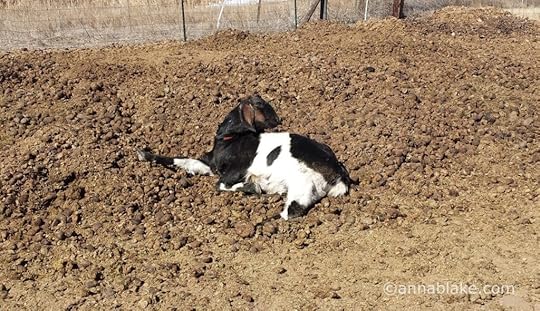
Wrung out and pooped from consecutive days of snow and 40 mph winds, interspersed with monster gusts that felt like open-hand slaps. The horses stayed under shelter until the storm broke and then dragged themselves out to open dirt and slept all afternoon. I was too tired. The difference between life and the weather is during a severe storm, you tie things down and wait for it to pass. In life, you half-believe you get a tiny bit of steering, even heading toward a cliff.
How I could tell I was losing it: I kept staring out my studio window during the storm. The window faces north, toward the barn. The snow had obliterated my window, so thick that barely any light came through. Then I’d go into the bathroom and stand in the shower looking out that window for the identical view. Then I walked to the freezer, pulled out a Girl Scout thin mint, and went back to the first window.
How I could tell I was losing it: I was way too interested in a small patch of bulbs at Emily’s farm. Emily lives in Washington state, where winter has fewer months. She has been posting daffodil progress updates, which I cling to like a lonely girl waiting for her phone to ring. Tiny shoots are buds now and the suspense is killing me. Meanwhile, the ducks and geese are loitering on our frozen pond, tapping their webbed toes, as impatient as me. Don’t tell them where I keep the cookies.
 How I could tell I was losing it: I saw a cybertruck at an intersection with a magnetic door sign identifying a small local business. I felt sorry for him first because my immediate reaction was a blinding-hot desire to broadside him. I felt actual rage. And sorry secondly because his small business is probably struggling like mine. On top of that, I was in the passenger seat and couldn’t reach the gas pedal, anyway. Which is my overall feeling about life these days.
How I could tell I was losing it: I saw a cybertruck at an intersection with a magnetic door sign identifying a small local business. I felt sorry for him first because my immediate reaction was a blinding-hot desire to broadside him. I felt actual rage. And sorry secondly because his small business is probably struggling like mine. On top of that, I was in the passenger seat and couldn’t reach the gas pedal, anyway. Which is my overall feeling about life these days.
I’m a political science geek who got a jumpstart watching Meet the Press in high school. The world fascinates me, but my primary concerns are women, climate, and global welfare. I’m not as interested in partisan politics, other than to think there are too many old white men making decisions for women. Too many pasty-skinned office dwellers who spend too little time outdoors to know nature’s infinite worth. Too many power plays and false walls driving the world apart rather than building peaceful interdependence for all. Sure, it’s asking a lot.
This week, I agreed with David Brooks, a conservative who now seems moderate. We’re both nauseated. Bereft for the dream of America. Not recognizing our home or neighbors. So much loss, so much hardness. And I got depressed.
Sometimes in the middle of the night, my dog moves out of arm’s reach because the compulsive petting is keeping him awake. I worry about the future of our species. They say women our age are too old to care, but we aren’t too old to remember. I worry about who we might become if we lose our integrity. If we break all our promises. Watching Meet the Press hasn’t changed. Politics isn’t a faraway soap opera. It’s alive and personal. We carry the blood of the immigrants who built this country on freedom, not domination. The Wall Street economy lives in our pockets. The Golden Rule still applies.
 Lately, it hurts to watch the news. Things we’ve done should embarrass us. We flipped sides and lost our way. We started fights with our neighbors. Maybe politicians can’t see out their windows either. They forgot America is bigger than its bickering parts. Ugly as it is, now is no time to look away. Maybe especially women of a certain age who have been told one too many times they are too “emotional” for the important work. They’re making us look more intelligent and well balanced by the minute.
Lately, it hurts to watch the news. Things we’ve done should embarrass us. We flipped sides and lost our way. We started fights with our neighbors. Maybe politicians can’t see out their windows either. They forgot America is bigger than its bickering parts. Ugly as it is, now is no time to look away. Maybe especially women of a certain age who have been told one too many times they are too “emotional” for the important work. They’re making us look more intelligent and well balanced by the minute.
Why should a horse trainer lip off about politics? I’m what they call a micropreneur. Just me, self-employed, and hanging on while paying higher prices for my online sites, liability insurance, and business overhead. And none of my horses seems prone to egg laying, so there’s all that, too. Not to mention I pay more taxes than billionaires who want to fly into space but don’t have the decency to make it a one-way trip.
I’m the sort of rugged individual one party claims to value, but like the other party, I feel compassion for those who have less. And I’m lucky. I have a farm and can’t stand around eating thin mints all day. There is manure to muck. It isn’t a literary analogy. It’s the physical activity that clears excrement from the barn, but also the mind. A couple hundred pounds of muck, and I remember just who I am.
Why should a horse trainer lip off about politics? Because in a free country, politics is everyone’s business. We can’t simply bear witness when we have voices that stand in the wind. Strength and wisdom to share. Horses are boring, they say. Horse women are all nuts, they say. What I write has a broader meaning in relationships, in life skills, and sometimes I hope these words encourage us to slog on. Even when it feels like spring will never come. I write parables about horses, but I intend to affirm the best of who we are, because I know us. We have watched love die, and against the odds, survived to love again and yet again.
I like to call us Gray Mares. Borrowed respect for elder mares who have a well-earned confidence, along with the practical knowledge of how things should run. Blind obedience isn’t even on a mare’s list of possibles. She takes herself seriously, a concept frequently lost on geldings. She keeps a sense of humor, also lost on geldings. How to get on the good side of a mare? Don’t underestimate her or get in her way. Respect her independence. Acknowledge her intelligence by listening. Be honest and keep your word. Be worthy of her trust.
If mares were to quote a human, they might choose Eleanor Roosevelt. She walked with a coltish stride in practical shoes, and was called “horse-faced” by people she intimidated. Roosevelt said: “No one can make you feel inferior without your consent.”
Need a break from the chaos? Take a day to cry and howl and nap under your grandmother’s quilt. Then pull on your Wellies and grab your forks.
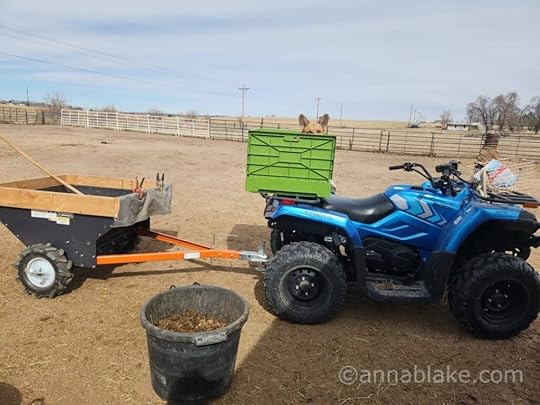
…
An audio version of this essay is available to subscribers on Substack.
Find Anna Blake and The Gray Mare Podcast on Substack or BlueSky social media. For specific horse training advice, search 1500 essays in our archives here.
Join us at The Barn School, our social and educational site, with member sharing and our infamous Happy Hour. Everyone’s welcome.
Visit annablake.com for archived blogs and signed books, to subscribe to this blog, or ask Anna a question about the art and science of working with horses. Become a sustaining member, a “Barnie.” Subscribe to our online group and support the best bunch of like-minded horsepeople anywhere.
Ride for a new brand, find our Relaxed & Forward and Undomesticated Women swag at Zazzle.
Affirmative training is the fine art of saying yes.The post Finding Sanity While Worrying for the Future appeared first on Anna Blake.



